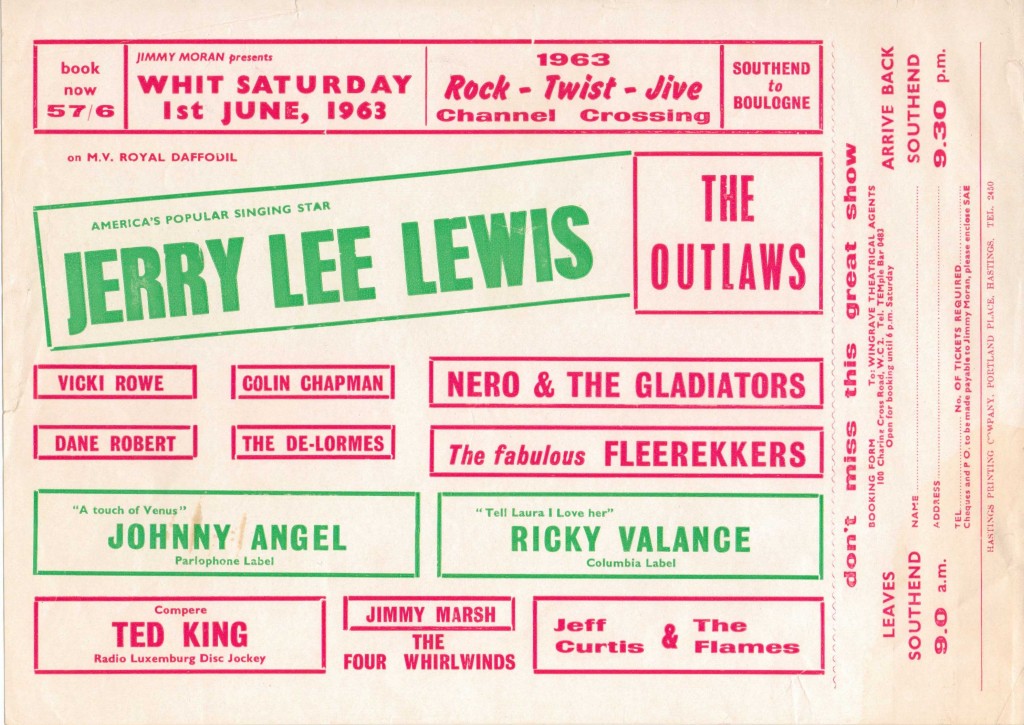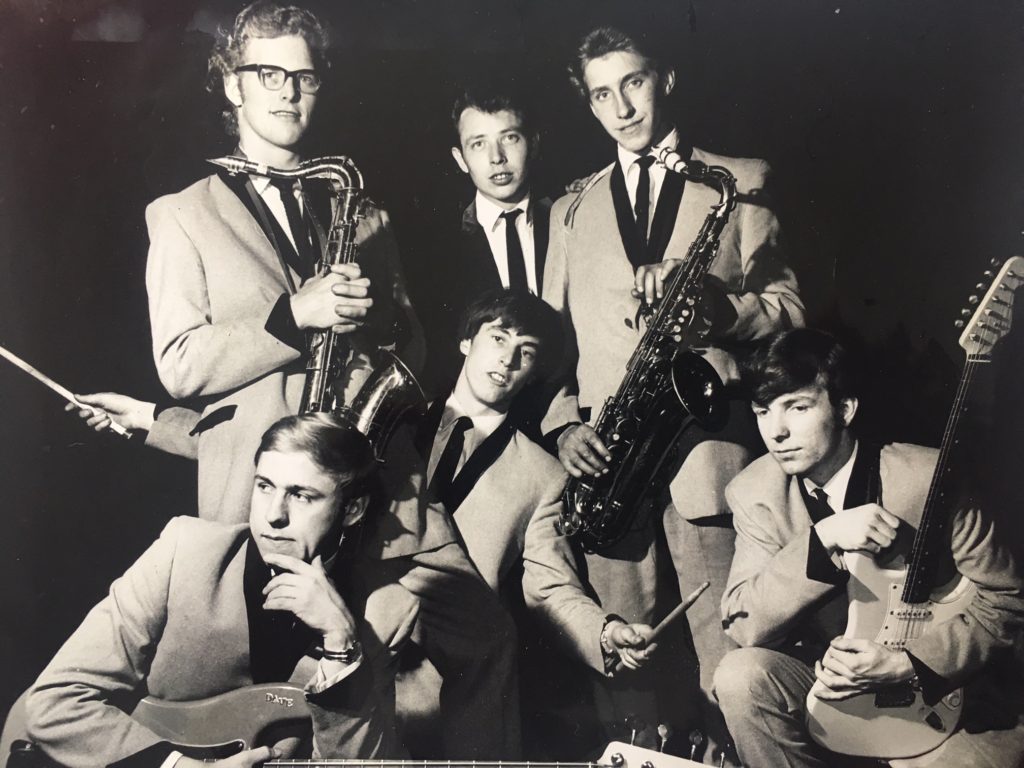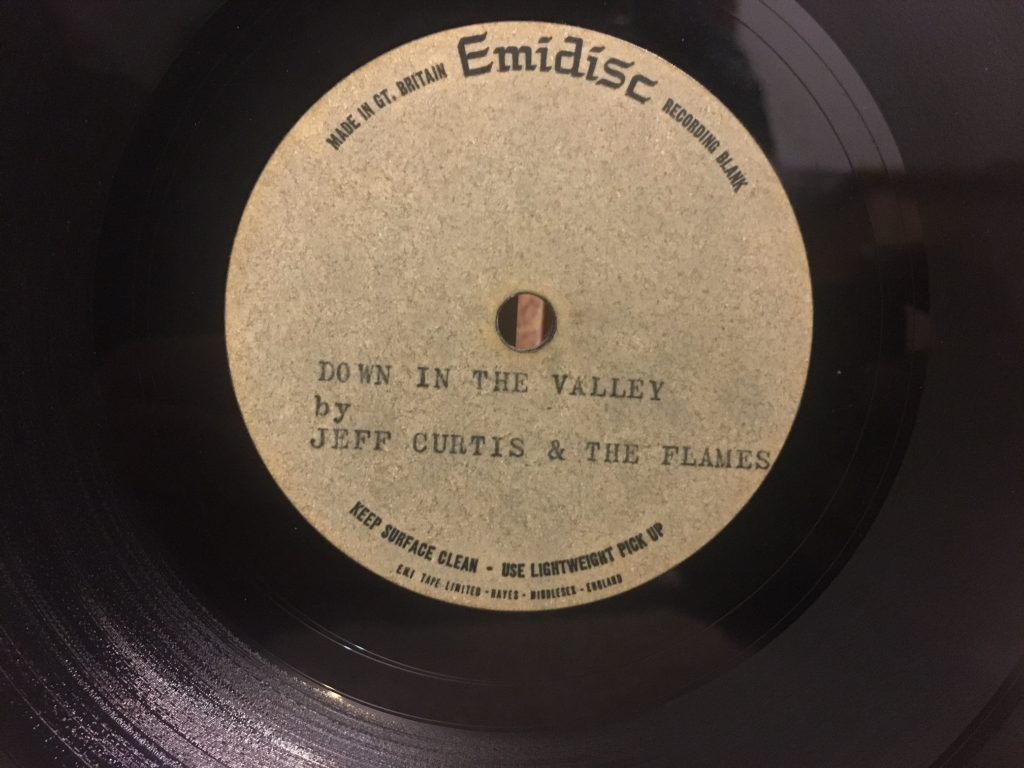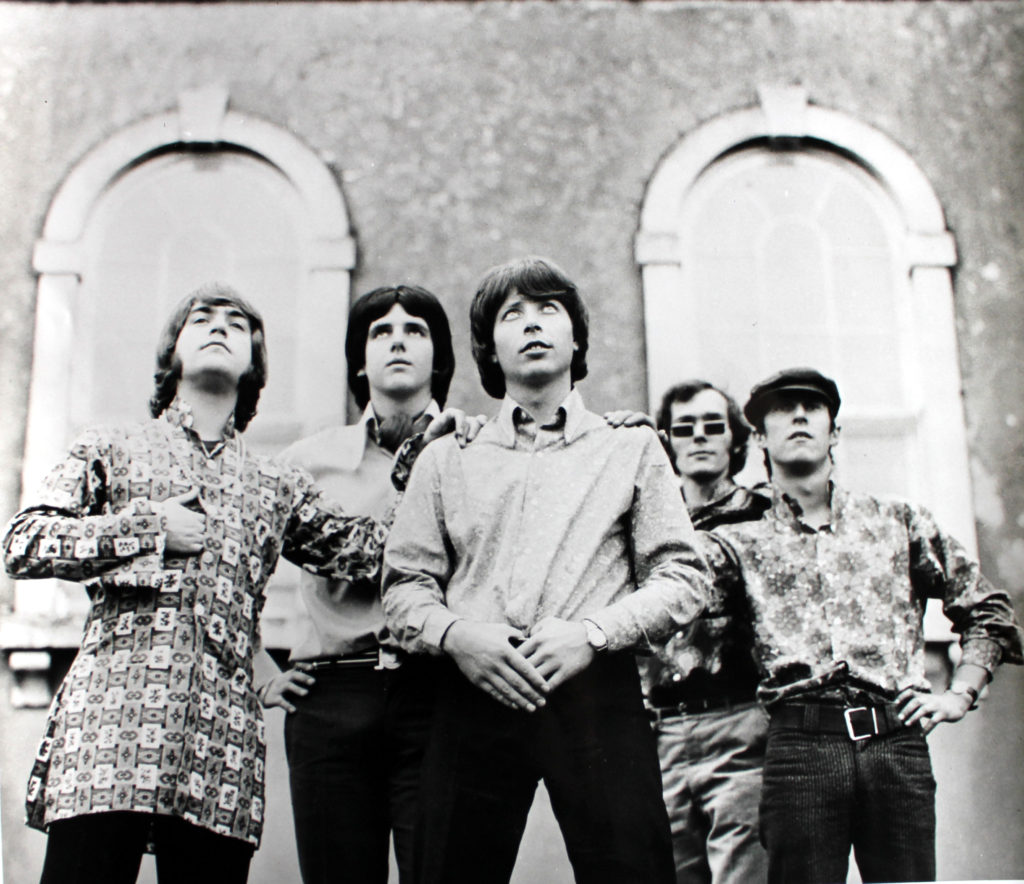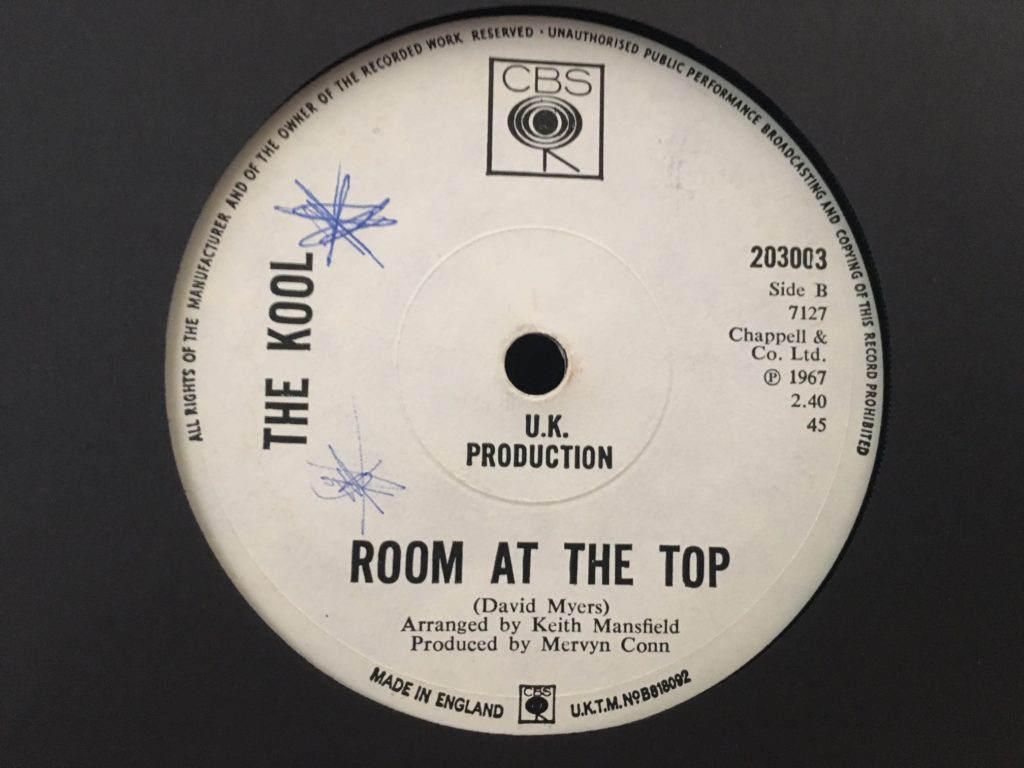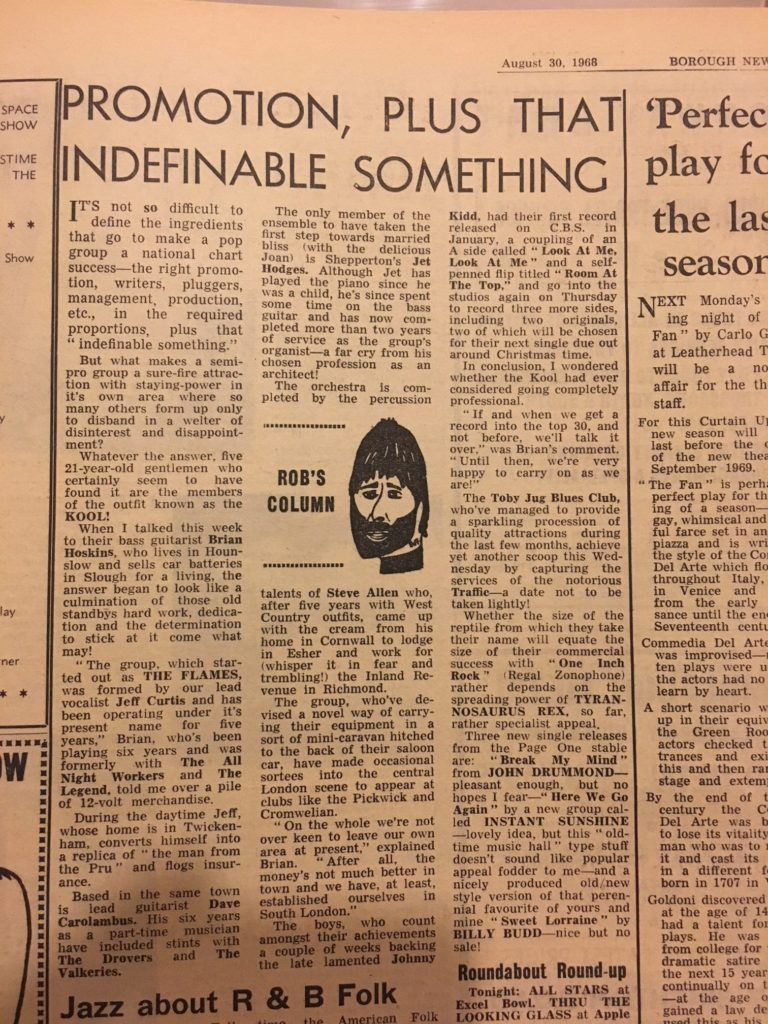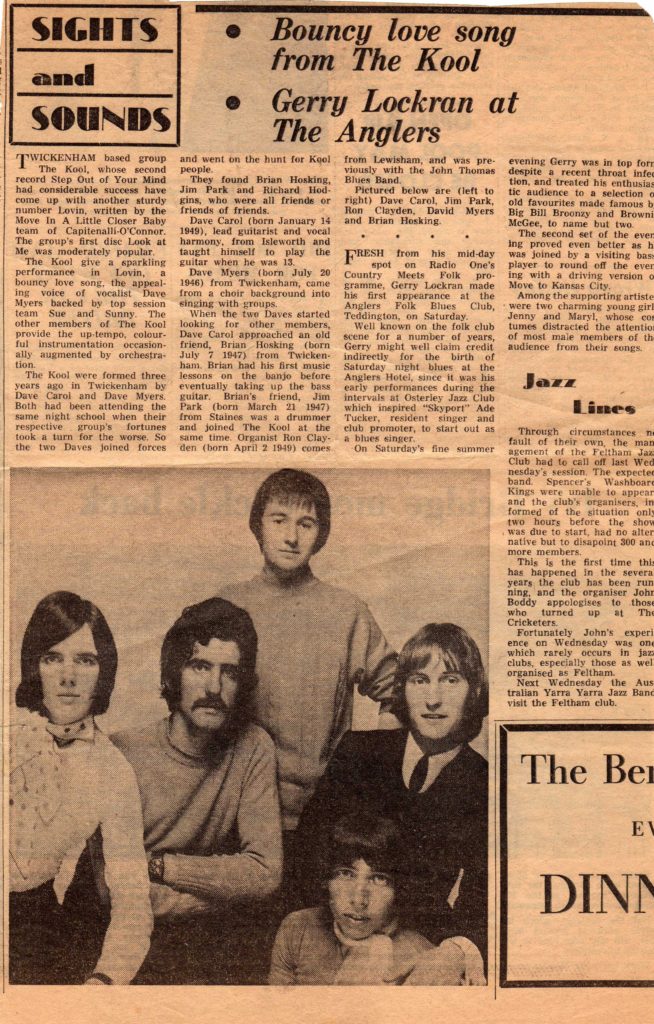By Nick Warburton
In October 1967, CBS Records shipped the debut single by a rather pretentiously named group called The Kool.
The Kool in Richmond upon Thames, 1967, left to right: Ray Brown, Jeff Curtis, Pete Burt, Dave Carol and Jet Hodges
Produced by rock music impresario Mervyn Conn and arranged by sought-after studio wizard Keith Mansfield, Tony Macauley and John McLeod’s “Look at Me, Look at Me”, with its soaring, vocal harmonies and delicately crafted instrumentation had all the hallmarks of an Ivy League record. In contrast, the flipside, “Room at the Top”, was an unusual mod/soul workout, with the singer’s gruff lead vocals backed by cello, horns and Hammond organ.
To the casual listener, the tracks sound like two different groups, which is not far from the truth. To minimise studio costs and achieve the top notch production desired, Conn recruited session musicians to lay down the intricate backing tracks on The Kool’s CBS recordings. While this policy was not unusual for its day and befell even successful chart acts like The Love Affair, The Kool was a seasoned pool of musicians with a long and fascinating history.
Hanworth, Middlesex-based insurance salesman, turned aspiring singer David Myers (aka Jeff Curtis) was there from the outset, founding the group as Jeff Curtis & The Flames in 1961 (https://bit.ly/2B3wncP).
Jeff Curtis and The Flames 1963, left to right: Louis McKelvey, Keith Gardiner, Jeff Curtis, Malcolm Tomlinson, Dave Wigginton and Malcolm Randall
However, in June 1962, Myers remodelled the outfit with lead guitarist Louis McKelvey and bass player Dave Wigginton from Twickenham band, Johnny & The Pursuers. Rhythm guitarist Keith Gardiner and drummer Malcolm Tomlinson (ex-Panthers) rounded up the numbers (and were joined slightly later by sax player Malcolm Randall).
Contemporaries of The Rolling Stones, The Flames were regulars at the Ealing Club and on 1 June 1963 participated in the infamous ‘Rock Twist Jive Channel Crossing’ extravaganza with Jerry Lee Lewis, among others.
In October 1963, Jeff Curtis’s outfit (minus Randall) cut four demos at Lansdowne Studios in Holland Park – covers of Bobby Troup’s “Route 66”; Chuck Berry’s “Bye Johnny” and “It Don’t Take But a Few Minutes” (with noted jazz drummer Lenny Hastings behind the kit) and Robert Allen and Richard Adler’s “Everybody Needs a Lover”. (Ed: an edited version of “Route 66” later surface on Acid Jazz’s Rare Mod series and “Everybody Needs a Lover” was picked by Cherry Red for its Fab Gear boxed set).
When the recordings failed to take the band further Keith Gardiner departed in late 1963 and Ray Soper joined on keyboards.
During early 1964, the band auditioned for Decca Records but none of the surviving members can recall the song titles or how many tracks were recorded, although Chuck Berry covers did feature heavily in the group’s repertoire.
Malcolm Tomlinson was next to leave and Pete Burt, the younger sibling of Cliff Bennett’s (and later Chas & Dave) celebrated drummer Mick Burt, assumed the drum stool in July 1964. The group then made the first of two unsuccessful visits to Joe Meek’s Holloway Road studios to cut some tracks.
Jeff Curtis and The Flames, late 1964, clockwise from bottom left: Dave Wigginton, Malcolm Randall, Pete Burt (drums sticks), Jeff Curtis, Jeff Lake and Louis McKelvey
With sax player Jeff Lake succeeding Ray Soper that September, The Flames cut two demo tracks at Lansdowne Studios around October 1964 – a great take on Solomon Burke and Bert Berns’s “Down In The Valley” and a cover of The Showman’s “Rock & Roll Will Stand” before further changes ensued.
1964 demo tracks courtesy of Dave Wigginton
Jeff Curtis and The Flames – Down In The Valley
Jeff Curtis and The Flames – Rock And Roll Will Stand
By April 1965, first Louis McKelvey, then Malcolm Randall and finally Dave Wigginton had jumped ship leaving Jeff Curtis to recruit lead guitarist Dave Carol, sax player George Russell and bass player Ray Brown, the latter co-author of Heinz’s single “Heart Full of Sorrow”. However, by mid-July 1965 both horn players were out and Ray Soper was back on keyboards.
Jeff Curtis and The Flames late 1965, left to right: Ray Brown, Jeff Curtis, Ray Soper, Pete Burt and Dave Carol
Through Pete Burt’s job as a window cleaner, The Flames landed a brief gig backing British rock ‘n’ roll legend Johnny Kidd in April 1966. Around this time they also made a second, unsuccessful, visit to Joe Meek’s studio. More importantly, they returned to Lansdowne Road to cut two new, original, numbers – Dave Myers and Ray Brown’s “Room at the Top” and “I Ain’t The Fool”.
The recordings complete, Soper was elbowed out of the band and reformed The Pirates with future Deep Purple bass player Nick Simper.
With Jet Hodges joining Jeff Curtis, Dave Carol, Ray Brown and Pete Burt, the revamped line up continued to gig as Jeff Curtis & The Flames until mid-1967. Mervyn Conn then arrived on the scene, championing the band and renaming them The Kool that August (https://bit.ly/2KIAGKk).
The Kool late 1967. Left to right: Ray Brown, Dave Carol, Jeff Curtis, Jet Hodges and Pete Burt
“He thought we were better than what we were,” remembers Brown. “I could not believe it. We were playing at these nightclubs and he used to come and bring people down and say, ‘This is my new group, The Kool’. ‘Harmony band’ he used to call us… but we weren’t really a harmony band at all. We were nowhere near a name group.”
Having already recorded a demo of “Step out of Your Mind”, a US hit for The American Breed, the group’s producer/manager had other ideas for a debut release.
“Conn came up with some songs for us to do, rehearse and record… but then he had this song from Macaulay, who had big hits with Long John Baldry at the time,” continues Brown. “Conn says, ‘That’s just right for my new group and we’ll record it. I’ll put my money where my mouth is, go into CBS and do it and book a top arranger’. ‘Look at Me, Look at Me’ was out of our hands.”
The Kool 1967. Left to right: Jet Hodges, Dave Carol, Ray Brown, Pete Burt and Jeff Curtis
Recorded over a two-day session at CBS’s Regent Street studio with top notch session players, including drummer Clem Cattini, Brown remembers the backing tracks being cut on the first day with the vocals for “Look at Me, Look at Me” and “Step Out of Your Mind” recorded the next with help from The Ivy League.
“I was just in awe of these people,” he reflects. “I thought, ‘how can you be that good?’ It was fantastic and I was frightened to death because I knew our vocals weren’t up to it.”
However, Mervyn Conn wanted at least one band member to sing on “Look at Me, Look at Me” and surprisingly it was Brown rather than Jeff Curtis who was chosen to sing the lead vocal line.
As for the two remaining tracks, Brown insists that session players also appear on “Room at the Top” but simply copied The Flames’ demo from May 1966. The same is probably true of the fourth track – Ralph Murphy’s “Funny (What a Fool Can Be)”, which, like “Room at the Top”, features Jeff Curtis on lead vocals.
https://www.youtube.com/watch?v=XQoS7qoWNxQ
Also covered by Flying Machine, “Look at Me, Look at Me” was released on 12 October 1967 and Peter Jones writing in Record Mirror noted: “… with a strong intro and falsetto-filled vocal… a rather soothing release, which does nicely on me ear-drums.”
Despite its obvious chart potential, and Tony Blackburn’s plug on Radio 1, the single stalled and is now a rarity, although “Room at the Top” can be heard on Colour Me Pop, Volume One CD. Two months later, CBS rush released “Step of Your Mind” as a follow up but then for some inexplicable reason immediately withdrew it.
One explanation might have been that Ray Brown had departed to join the more vocal orientated Champagne. “I could see from the experience at CBS that our future was not in recording because we’d used the Ivy League,” he says. “I thought, ‘That ain’t going anywhere’.”
It probably also didn’t help that “Room at the Top” had been credited solely to David Myers. Brian Hosking from Twickenham bands The Legend and The All Night Workers took over the bass.
Kingston and Malden Borough News noted that The Kool ventured back into the studio in September 1968 to record further material for a Christmas single but none of the members has any recollections of these mystery tracks. Not long after Pete Burt threw in the towel, and briefly reunited with former Flames’ horn player George Russell in The Army.
The Kool, Kingston and Malden Borough News, August 1968
Carol’s old friend Geoff Coxon, who’d previously toured with The Others (who’d been at school with Brian May) and Delroy Williams & The Sugar Band, among others, took over the drum stool.
Then on 18 April 1969, CBS re-released “Step out of Your Mind”, albeit with a different serial number! Despite being superior to The American Breed’s version, it was too little, too late and the single bombed. A dancefloor hit waiting to be discovered, “Step out of Your Mind” appears on several CD compilations, most notably Floor Filler Killers – New Directions Volume 3 and Piccadilly Sunshine Part Two.
With Mervyn Conn and CBS out of the picture, The Kool signed to MCA, and under the direction of producer Phil Swern and arranger Tom Parker recorded a cover of Capitanelli and O’Connor’s “Lovin’” backed by David Myers’s “Baby’s Out of Reach”. As Coxon recalls, both sides were recorded in one session with Sue and Sonny providing the backing vocals. The brass was added later.
https://www.youtube.com/watch?v=MoOTG9FJ_EA
Released on 27 June 1969, the single stalled but by then both Jet Hodges and Geoff Coxon were gone, succeeded by Ronnie Clayden and Jim Park. Then, in late 1969, the unthinkable happened – Jeff Curtis bowed out.
The Kool, August 1969. Left to right: Dave Carol, Jim Park, Ronnie Clayden, Jeff Curtis (bottom) and Brian Hoskings
The Kool carried on with new singer Roger Semon, today a consultant for BMG and an associate producer for Elvis Presley, but subsequently morphed into Easy Virtue; the group’s “Bye Bye Honey” can be heard on Acid Jazz’s Rare Mod Volume 5.
Since then, former members have popped up in the most surprising of places. Ray Brown and Roger Semon formed Crackers and in 1976 were studio winners on Opportunity Knocks; three tracks released on an EP under the name Horrorcomic reached number 28 on Melody Maker’s punk charts. Earlier, Brown had appeared on the single “Dark Side of The Moon”, released on Decca in 1971, under the name The Outer Limits.
Brian Hosking and Geoff Coxon continue to play the live scene. Hosking gigs with a reformed version of The All Night Workers while Coxon briefly played with a reformed The Others who morphed into Big Steam.
Former Flames also maintained a profile. Malcolm Tomlinson, who died in April 2016, appeared on two singles by The Penny Peeps and took part in Elton John’s debut BBC radio session before moving to Canada in 1969 with Louis McKelvey, who’d recorded with The Upsetters and The A-Cads in South Africa and Our Generation and Influence in Canada after leaving The Flames. Forming Milkwood, they recorded an unreleased album at the Hit Factory with Jerry Ragavoy. Tomlinson later recorded an unreleased album with Rick James’s original Stone City Band and two solo albums. McKelvey died in November 2017.
Malcom Randall meanwhile subsequently recorded with Manchester’s Playboys while Jeff Lake appeared on a single by Tommy Bishop. George Russell joined The Army alongside future Sweet bass player Steve Priest (Pete Burt, who died in March 2013, briefly joined after Priest’s departure).
The man who had started it all off – David Myers went into business and initially was very successful, even starting his own record label. Sadly, his life ended in tragedy in the early 2000s.
Thanks to Kool members Ray Brown, Pete Burt, Dave Carol, Brian Hosking, Geoff Coxon, Ronnie Clayden for help with the story. Also, thanks to former Flames’ members, Keith Gardiner, Dave Wigginton, Louis McKelvey, Malcolm Tomlinson, Malcolm Randal, Ray Soper, Jeff Lake and George Russell.


